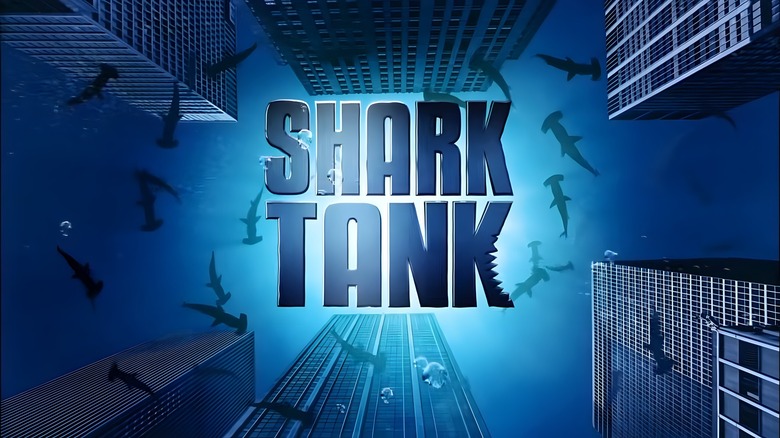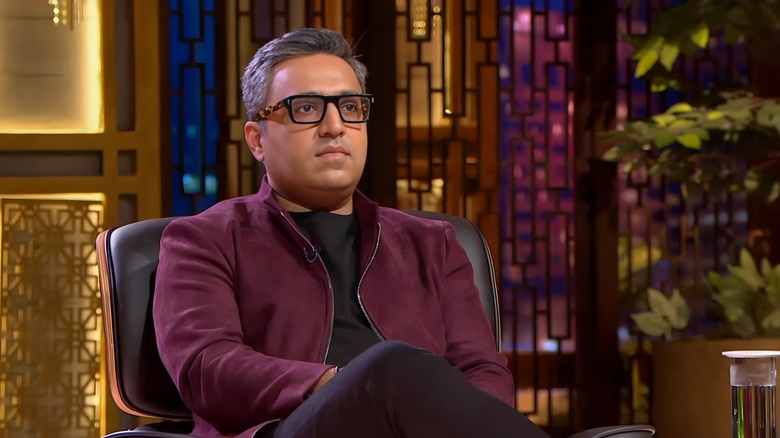A Shark Tank Controversy Is Rocking India Right Now - Here's What's Happening
When "Shark Tank India" premiered in 2021, local entrepreneurs were eager to go diving for deals with the show's panel of wealthy investors. Now, however, some of those entrepreneurs are saying the so-called "Sharks" have left them treading water.
According to sources for the Indian financial outlet Moneycontrol, the show's investors are refusing to close deals they agreed to on the show by way of ghosting entrepreneurs — in some cases, for more than a year. "The sharks are big-time bullies, big-time snobs," claims Mohit, one of many former contestants who spoke to Moneycontrol. "They respond only when they want to. I went to the show with such high hopes and today we are at a point where we may have to shut down the company, despite securing a deal." He allegedly hasn't heard from his "Shark Tank" partners since a follow-up meeting that took place six months after the initial pitch.
Mohit isn't the only "Shark Tank India" contestant feeling the cold shoulder from their newfound business partners, with one contestant going so far as to claim that his business was actually negatively affected by engaging with them in the first place.
Contestant says his business was abandoned after its valuation was slashed
American viewers are likely aware of the "Shark Tank" effect, a phenomenon that sees featured businesses receiving a large bump in sales and/or investment interest following their appearance on the program. Raj, another source for Moneycontrol, experienced a very different "Shark Tank" effect.
Raj did experience an influx of interested investors, though he immediately has to inform them that, after nine months, his deal is still up in the air. "Now, when I speak to new investors, they first enquire if my deal with the sharks has closed," he said. "I am left with no choice but to tell them that it hasn't moved since the show..." Raj's situation is uniquely difficult, as the sharks lowered his valuation during his pitch. "[B]ecause my valuation was lowered, new investors aren't willing to give me money at anything above the 'Shark Tank' offer."
As more entrepreneurs share their stories, Raj is beginning to feel as though the investing panel was never interested in working with him at all. "If the sharks didn't intend to invest, why lower my valuation," he asked, seemingly baffled, to Moneycontrol. "After the whole experience I feel I would have been better off if I had not come on the show."
Investor Anupam Mittal calls these claims flimsy and ill-intentioned
In response to these allegations of professional neglect, "Shark Tank" investor Anupam Mittal shared a long and annoyed-sounding statement on LinkedIn. Referencing previous allegations that the show was scripted and that the "Sharks" don't invest their own money, he wrote, "In every case, it's not hard to spot a pre-determined, ill-intentioned narrative with no data or sources to back said claims. It is no surprise, then, that another flimsy controversy is doing the rounds. Again, no data, no real names. Just finger-pointing and in one case, an angry & irrelevant commentator thrown in for added masala." The paragraph was punctuated with an eye-roll emoji.
That "angry & irrelevant" commentator appears to be Ashneer Grover, a former shark described as "controversial" and "contentious" by Moneycontrol. "Sharks are called sharks because they're expected to take decisions and act quickly so that the 'fish' (the pitcher) has no time to react," he said in an "outburst." "If they say 'no, it takes time,' then they shouldn't be called sharks — they should be called dolphins, instead." Mittal, boasting the show closes two-thirds of every deal they make on the series (a clearance rate allegedly superior to the U.S. series), says a year's time is often necessary to close a deal as an informed investor. Grover disagrees: "It's stupid to take a year to close a deal one has promised on the show," he said. "No founder, even the sharks, would ever wait for a year to close a deal. It is unfair to the business."
The two men's opposing views are part of a larger dialogue that seemingly reveals a radical difference in what contestants expect when they arrive on set and what investors intend to do after they walk out.
Contestants allege deals don't close because investors alter the terms
According to Anupam Mittal, "Shark Tank India" deals can fall apart for any number of reasons outside an investor's control, including failed due diligence checks (regarding tax, legal, or financial information), failure to meet obligations outlined during their "Shark Tank" pitch, or the contestant simply choosing to walk away. All of this seems fairly standard for the franchise when compared to its U.S. counterpart.
However, some contestants express feelings of being deceived or otherwise taken advantage of after the cameras stop rolling. Kunal, a source for Moneycontrol, said his deal was almost immediately thrown into flux after his on-set agreement, with "Shark Tank" claiming that they had to delay the deal because a one-hour pitch "cannot tell a shark enough about the business." If that refers to the need for further due diligence (involving lawyers and accountants not present at taping), that would be in line with Mittal's statement and how the U.S. series operates, though it's hard to understand for certain from the vague quote relayed by Kunal.
Regardless, the problems seem to extend beyond sharks claiming to be under-informed post-filming, with some contestants alleging that they were ambushed with altered deals months later. Mohit says that at his follow-up meeting, the shark brought a team of seven negotiators to readjust the valuation of his business from what they agreed on during the show. "We did not budge and it wasn't possible for us to do so too just for the shark," he said. "And that's the last we heard from them. They have been AWOL (absent without leave) since."
Investor Ashneer Grover calls for accountability
Anupam Mittal maintains that there has been no foul play at "Shark Tank India" and that deals made on the show are always done in good faith — at least on his end. He closes out his LinkedIn response with, "To founders who might have made such claims (questionable since we have no real names), here is an open invitation — please step forward. In the exceptional case that you have been wronged, let's fix that. If you are just pissed off because you couldn't extract money without meeting your obligations, well, lesson well learned."
Ashneer Grover proposed a potential — if arguably unconventional — solution to this issue: Have the sharks put down cash upfront. "Sharks should be asked to put the money they plan to invest in an escrow account," he said. "That way there is accountability and a budget, which ensures that none of them over-commit and later cancel."
It's hard to provide much context as to whether or not "Shark Tank India's" long closing times are reasonable or not, not least of all because it and the U.S. "Shark Tank" operate in vastly different economies. Furthermore, just because a practice may be in line with the U.S. "Shark Tank" does not necessarily mean it's reasonable for either iteration of the show. However, as one point of comparison, we were able to find that Black Sands Entertainment closed their deal with U.S. investor Kevin Hart after about a year, thanks to a company announcement. (Normally, it's difficult to ascertain for sure whether or not a "Shark Tank" deal actually closed, much less how long it took to do so.) In any case, hopefully those entrepreneurs feeling slighted take advantage of Mittal's invitation and are able to resolve their business woes.




